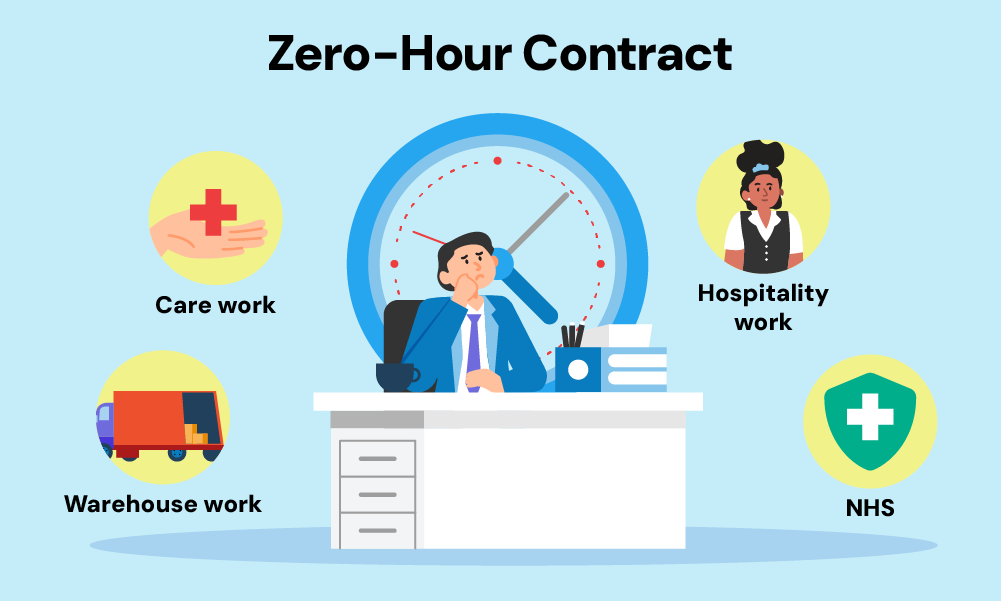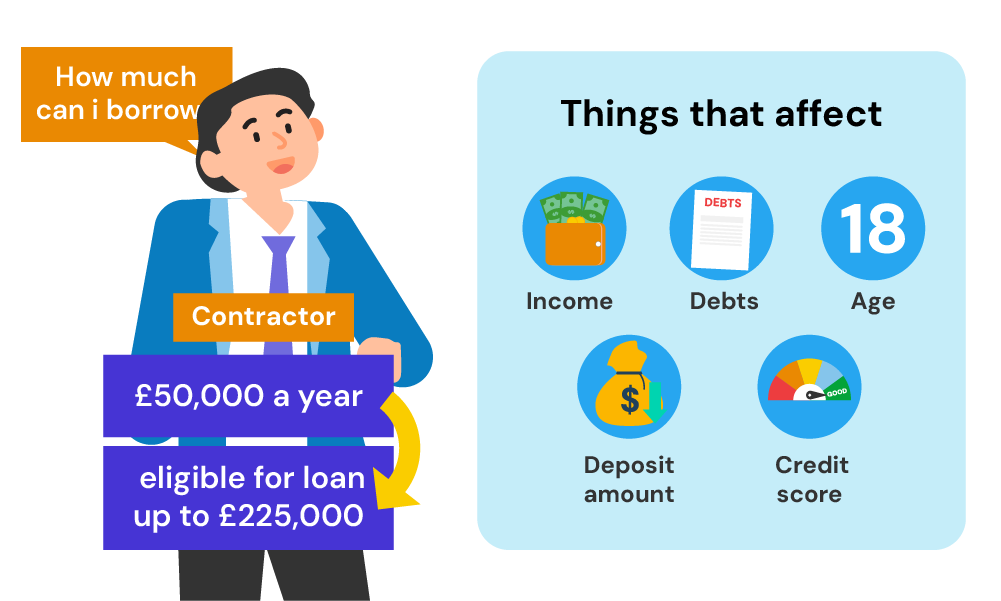How To Qualify For A Mortgage On A Zero-Hour Contract?

Zero-hour contracts don’t guarantee regular hours, making your income vary each week.
This can make budgeting and applying for a mortgage challenging, as lenders prefer steady incomes.
However, getting a mortgage with a zero-hour contract is possible. You’ll need to show lenders you can manage fluctuating earnings.
This article explains everything you must know about getting a mortgage on a zero-hour contract.
What Is a Zero-Hour Contract Mortgage?
A zero-hour contract mortgage is a loan for buying a home designed for people who work on zero-hour contracts. It’s pretty much the same as any other mortgage, but it takes into account that your income might not be the same every month.
Lenders who offer these mortgages have special ways to figure out how much you can borrow. They look at your income over the past year or two, not just at one point in time.
This means they get a better picture of how much money you’re making and how likely you are to keep making it.
This approach helps them feel more confident about lending you money, even if your job doesn’t guarantee you hours every week.
In short, zero-hour contract mortgages are for people whose work doesn’t fit the usual 9-to-5 mould. They show that even if your job is a bit different, owning a home might still be within reach.

Can I Get a Mortgage on a Zero-Hour Contract?
Yes, it’s possible, though a bit more challenging.
The key is to clearly show lenders your financial reliability and prepare your application carefully.
In the UK, many lenders, actually over two-thirds, are open to zero-hour contract applications.
They recognize that those on zero-hour contracts can be just as reliable in repaying loans as anyone else.
Instead of focusing solely on your most recent paycheck, these lenders will review your income from the last year or two to calculate your average earnings.
While not every lender may be willing to offer a mortgage to someone on a zero-hour contract, there’s a wide enough selection to explore. Some may require a longer history of income or a larger deposit.
But, with the right approach and support from a skilled mortgage broker, finding a mortgage that matches your employment situation is within reach.
Am I Eligible?
If you’re applying for a mortgage with a zero-hour contract, lenders will check a few key things to see if you’re financially stable.
Different lenders might ask for different things, but they all generally want to know about:
- Length of Employment. They like to see you’ve been with the same employer for at least a year on a zero-hour contract. It shows you have a stable job.
- Proof of Income. Showing how much you earn is important. You might need to show your P60s, the payslips from the last 12 months, or bank statements that prove you regularly get paid by your employer. This helps them figure out your average income and if you can keep up with mortgage payments.
- Stability of Earnings. Beyond just the amount, lenders look at how stable your earnings are. They may calculate your average income over the past two or three years to get a sense of any fluctuations. Some lenders might also consider if your income has been increasing, which could be a positive sign of employment stability.
- Continuous Employment History. If you’ve been working continuously, even with zero-hour contracts, that’s a plus. Lenders get nervous if they see big gaps between jobs because it might mean your income isn’t stable.
- Credit History. They will check your credit history to see how well you handle money. A good credit score and responsible credit use can make your application stronger.
- Deposit Size. How much deposit you have matters. A bigger deposit lowers the risk for the lender, which could help you get a mortgage.
- Overall Financial Health. Lenders will look at all your finances, including debts and monthly spending, to make sure you can afford a mortgage on top of everything else.
You’ll need to gather a lot of documents, like proof of income job history, and possibly references.
Since every lender is different, getting your paperwork in order and talking to a mortgage advisor can help. They can guide you based on what you specifically need.
How Much Can I Borrow?
When you apply for a mortgage on a zero-hour contract, lenders need to calculate your loan amount differently.
Instead of just looking at your yearly salary, they average your earnings over the last two or three years.
If your income from the last year better represents what you usually make, they might use that instead.
This average is then multiplied by 4 to 5 times to figure out how much you can borrow, but this depends on the lender and your financial health.
It’s also a good idea to get pre-approval from lenders. This means they’ll tell you how much you could borrow before you start looking for a house, helping you plan your budget better. It also makes your house search more focused.
Your deposit size plays a big role too. A larger deposit means you could borrow more because it reduces the lender’s risk.
For zero-hour contracts, you might need to put down a bigger deposit, around 15-20%, due to income variability.
This is higher than the typical 10% needed for regular employment, based on the lender’s requirements and your financial history.
Lenders will also consider your credit score, other debts, and monthly expenses to determine your loan amount. Knowing your financial situation and having your documents ready is crucial.

How To Get a Mortgage on a Zero-Hour Contract?
To apply for a mortgage start with the following steps:
Gather Your Financial Documents
You’ll need various documents to show your income and financial health. This includes:
- For the employed: Payslips (P60) or other income proof for the last 3-6 months.
- For the self-employed: Business accounts and tax returns (SA302) for the last 2-3 years.
- Bank statements for the last 3-6 months to show your income and savings.
- Identification and proof of address, like a passport and utility bills.
- Current and past work contracts if any
- Any proof of documents for existing loans and outgoings.
Check Your Credit Report
Grab your credit report from agencies – Experian, Equifax, or TransUnion. Fix any errors by contacting the agency directly. If your credit score is low, work on boosting it by clearing debts and keeping your credit card balances low.
Consult with a Mortgage Broker
A broker who knows the ins and outs of non-standard employment contracts can be a big help.
They’re familiar with lenders who accept zero-hour contract applications and can steer you towards the best mortgage options. They’ll also break down different lenders’ specific requirements for you.
Following these steps and preparing carefully can greatly enhance your chances of securing a mortgage on a zero-hour contract.
Remember, each lender has different criteria, so don’t be discouraged by setbacks. With persistence and the right approach, getting a mortgage is achievable.

Which Mortgage Lenders Accept Zero-Hour Contracts?
Several UK lenders are open to considering applications from individuals on zero-hour contracts, but their willingness can vary based on their assessment of financial risk and stability.
Mainstream lenders like NatWest, Halifax, and Barclays, for instance, have been known to lend to applicants on zero-hour contracts under certain conditions.
These conditions often include a stable income history over one to two years and proof of consistent earnings.
Tips To Improve Mortgage Application in a Zero-Hour Contract
Getting a mortgage with a zero-hour contract can be smoother if you follow these straightforward tips:
- Boost Your Credit Score. Your credit score matters a lot. Show lenders you’re good with money by paying your bills and loans on time, keeping your credit card debt low, and not applying for new credit cards or loans too often.
- Save a Bigger Deposit. The more you can pay upfront, the happier lenders are to loan you money. A bigger deposit could mean a better deal for you. Try to save more than the minimum required.
- Show Stable Income. Lenders need to see you have a steady income. Collect all your payslips, bank statements that show your income, and any other proof of what you’ve earned in the last two or three years.
- Cut Down Debts. Being in less debt makes you look less risky to lenders. Pay off what you owe and try not to rack up new debts.
- Get Your Papers in Order. Make sure all your financial paperwork is sorted and ready to go. This includes your P60, tax returns, and any other financial records.

The Bottom Line
Securing a mortgage with a zero-hour contract is challenging but achievable. The key lies in preparing well and understanding lender requirements.
Your goal is to demonstrate financial stability and find a lender that recognises your unique job situation.
Don’t let setbacks discourage you, as lenders vary in their criteria. A mortgage broker can simplify the process, connecting you with lenders open to zero-hour contracts.
Focus on improving your credit score, saving a larger deposit, and ensuring your income is consistent.
For help finding the right broker quickly and reducing stress, contact us. We’ll link you with a trusted broker suited to your mortgage needs.
Get Matched With Your Dream Mortgage Advisor...

Frequently asked questions
Can I get a buy-to-let mortgage on a zero-hour contract?
Yes, it’s possible. Some buy-to-let lenders are less concerned about your employment type and more about the potential rental income from the property. But, proving a stable income may still be necessary, especially if the lender has a minimum income requirement.
Can I apply for a mortgage jointly if I'm on a zero-hour contract?
Yes, you can.
Applying for a mortgage jointly can strengthen your application, especially if the other applicant has a steady income. Lenders will consider the combined income and creditworthiness of both applicants, which can make it easier to meet their lending criteria.
This article has been fact checked
This article was created, checked, and verified by the expert team at Money Saving Guru. Trust us, you’re in good hands.




